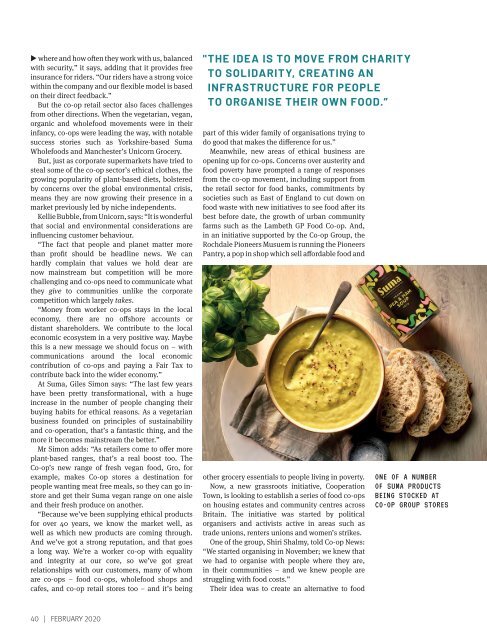Co-op News - February 2020
Co-operative Retail: ethical challenges in the modern world
Co-operative Retail: ethical challenges in the modern world
Create successful ePaper yourself
Turn your PDF publications into a flip-book with our unique Google optimized e-Paper software.
u where and how often they work with us, balanced<br />
with security,” it says, adding that it provides free<br />
insurance for riders. “Our riders have a strong voice<br />
within the company and our flexible model is based<br />
on their direct feedback.”<br />
But the co-<strong>op</strong> retail sector also faces challenges<br />
from other directions. When the vegetarian, vegan,<br />
organic and wholefood movements were in their<br />
infancy, co-<strong>op</strong>s were leading the way, with notable<br />
success stories such as Yorkshire-based Suma<br />
Wholefoods and Manchester’s Unicorn Grocery.<br />
But, just as corporate supermarkets have tried to<br />
steal some of the co-<strong>op</strong> sector’s ethical clothes, the<br />
growing p<strong>op</strong>ularity of plant-based diets, bolstered<br />
by concerns over the global environmental crisis,<br />
means they are now growing their presence in a<br />
market previously led by niche independents.<br />
Kellie Bubble, from Unicorn, says: “It is wonderful<br />
that social and environmental considerations are<br />
influencing customer behaviour.<br />
“The fact that pe<strong>op</strong>le and planet matter more<br />
than profit should be headline news. We can<br />
hardly complain that values we hold dear are<br />
now mainstream but competition will be more<br />
challenging and co-<strong>op</strong>s need to communicate what<br />
they give to communities unlike the corporate<br />
competition which largely takes.<br />
“Money from worker co-<strong>op</strong>s stays in the local<br />
economy, there are no offshore accounts or<br />
distant shareholders. We contribute to the local<br />
economic ecosystem in a very positive way. Maybe<br />
this is a new message we should focus on – with<br />
communications around the local economic<br />
contribution of co-<strong>op</strong>s and paying a Fair Tax to<br />
contribute back into the wider economy.”<br />
At Suma, Giles Simon says: “The last few years<br />
have been pretty transformational, with a huge<br />
increase in the number of pe<strong>op</strong>le changing their<br />
buying habits for ethical reasons. As a vegetarian<br />
business founded on principles of sustainability<br />
and co-<strong>op</strong>eration, that’s a fantastic thing, and the<br />
more it becomes mainstream the better.”<br />
Mr Simon adds: “As retailers come to offer more<br />
plant-based ranges, that’s a real boost too. The<br />
<strong>Co</strong>-<strong>op</strong>’s new range of fresh vegan food, Gro, for<br />
example, makes <strong>Co</strong>-<strong>op</strong> stores a destination for<br />
pe<strong>op</strong>le wanting meat free meals, so they can go instore<br />
and get their Suma vegan range on one aisle<br />
and their fresh produce on another.<br />
“Because we’ve been supplying ethical products<br />
for over 40 years, we know the market well, as<br />
well as which new products are coming through.<br />
And we’ve got a strong reputation, and that goes<br />
a long way. We’re a worker co-<strong>op</strong> with equality<br />
and integrity at our core, so we’ve got great<br />
relationships with our customers, many of whom<br />
are co-<strong>op</strong>s – food co-<strong>op</strong>s, wholefood sh<strong>op</strong>s and<br />
cafes, and co-<strong>op</strong> retail stores too – and it’s being<br />
"THE IDEA IS TO MOVE FROM CHARITY<br />
TO SOLIDARITY, CREATING AN<br />
INFRASTRUCTURE FOR PEOPLE<br />
TO ORGANISE THEIR OWN FOOD.”<br />
part of this wider family of organisations trying to<br />
do good that makes the difference for us.”<br />
Meanwhile, new areas of ethical business are<br />
<strong>op</strong>ening up for co-<strong>op</strong>s. <strong>Co</strong>ncerns over austerity and<br />
food poverty have prompted a range of responses<br />
from the co-<strong>op</strong> movement, including support from<br />
the retail sector for food banks, commitments by<br />
societies such as East of England to cut down on<br />
food waste with new initiatives to see food after its<br />
best before date, the growth of urban community<br />
farms such as the Lambeth GP Food <strong>Co</strong>-<strong>op</strong>. And,<br />
in an initiative supported by the <strong>Co</strong>-<strong>op</strong> Group, the<br />
Rochdale Pioneers Musuem is running the Pioneers<br />
Pantry, a p<strong>op</strong> in sh<strong>op</strong> which sell affordable food and<br />
other grocery essentials to pe<strong>op</strong>le living in poverty.<br />
Now, a new grassroots initiative, <strong>Co</strong><strong>op</strong>eration<br />
Town, is looking to establish a series of food co-<strong>op</strong>s<br />
on housing estates and community centres across<br />
Britain. The initiative was started by political<br />
organisers and activists active in areas such as<br />
trade unions, renters unions and women’s strikes.<br />
One of the group, Shiri Shalmy, told <strong>Co</strong>-<strong>op</strong> <strong>News</strong>:<br />
“We started organising in November; we knew that<br />
we had to organise with pe<strong>op</strong>le where they are,<br />
in their communities – and we knew pe<strong>op</strong>le are<br />
struggling with food costs.”<br />
Their idea was to create an alternative to food<br />
ONE OF A NUMBER<br />
OF SUMA PRODUCTS<br />
BEING STOCKED AT<br />
CO-OP GROUP STORES<br />
40 | FEBRUARY <strong>2020</strong>


















